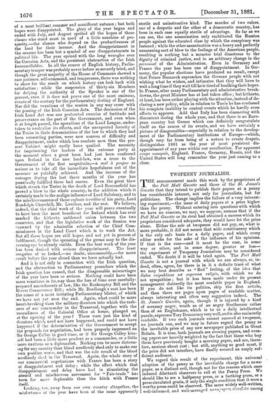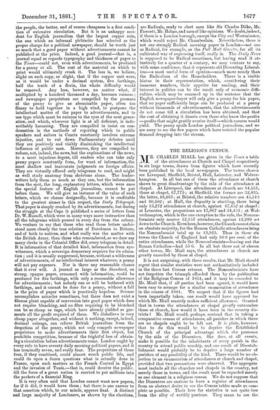TWOPENNY JOURNALISM.
THE announcement made this week by the proprietors of the Pall Mall Gazette and those of the St. James's Gazette that they intend to publish their papers at a penny has considerable interest, not only for journalists, but for politicians. The change implies• the failure of a very interest- ing experiment,—the issue of daily papers at a price higher than the penny. Without entering into questions with which we have no concern, we may, we suppose, assume that if the Pall Mall Gazette or its rival had obtained a success which its proprietors considered adequate, they would have let the price alone. Either the sale at twopence did not pay, or, what is more probable, it did not secure that wide constituency which is the only safe basis for a daily paper, and which every editor seeks for the sake of the influence of his opinions. If that is the case—and it must be the case, in some way or other, and in some degree, greater or less— the experiment of Twopenny Journalism may be considered ended. We doubt if it will be tried again. The Pall Mall Gazette is not a journal with which we can always, or, in- deed, often, agree, for there is in it a definite trace of what we may best describe as "Red" feeling, of the idea that Salus 7.eipublicae est suprema religio, with which we do not sympathise ; but it has been made under its present management distinctly the most readable paper in England. If you do not like its politics, skip the first article, and then there are pages upon pages of readable matter, always interesting and often very suggestive indeed. The St. James's Gazette, again, though it is injured by a kind of screamy anger, wrath as of an angry Southerner rather than of an Englishman, which is to us a daily intellectual puzzle, expresses Tory Democracy very well, and is also eminently readable. If two such journals cannot succeed at twopence, no journals can, and we may in future regard the penny as the inevitable price of any new newspaper published in Great Britain. It is true, both journals are evening papers, and even- ing papers are heavily weighted by the fact that those who buy them have previously bought a morning paper, and are, there- fore, anxious about cost ; but still, anything so good must, if the price did not interfere, have finally secured an amply suf- ficient audience.
We regard this result of the experiment, this universal adoption of the penny as the inevitable charge for a news- paper, as a distinct evil, though not for the reasons which once induced dilettanti observers to rail at the Penny Press. We should like to see a halfpenny press, or a farthing press, or a press circulated gratis, if only the single condition that it were a worthy press could be observed. The more widely well-written, well-informed, and well-managed news:tpers circulate among
the people, the better, and of course cheapness is a first condi- tion of extensive circulation. But it is an unhappy acci- dent for English journalism that the largest copper coin, the one which an informal plebiscite has selected as the proper charge for a political newspaper, should be worth just so much that a good paper without advertisements cannot be published at the price. Indeed, a good journal—that is, a journal equal as regards typography and thickness of paper to
the Times—could not, even with advertisements, be produced for a penny at all. The cost of the material on which to print would ultimately crush it. The loss is, we believe, slight on each copy, so slight, that if the copper unit were, as it would be under a decimal system, five farthings, half the tenth of a florin, the whole difficulty would be removed. Any loss, however, no matter what, if multiplied by a hundred thousand a day, becomes ruinous ; and newspaper proprietors are compelled by the pressure of the penny to give us abominable paper, often too flimsy to hold together in a high wind, to postpone the intellectual matter of the paper to advertisements, and to use type which must be ruinous to the eyes of the next gener- ation, and which, wherever light is at all deficient, is inde- scribably harassing. They are compelled to insist on con- densation in the methods of reporting which to public speakers and suitors in Courts constantly involves extreme injustice, and to cut down Parliamentary debates until they are positively and visibly diminishing the intellectual influence of public men. Moreover, they are compelled to reduce, not, indeed, the news, but the explanations of the news, to a most injurious degree, till readers who can take only penny papers constantly form, for want of information, the most shallow and inaccurate judgments on foreign affairs. They are virtually offered only telegrams to read, and might as well study anatomy from skeletons alone. The leader- writers help them as much as they can, but the information from the spot, the long, explanatory letters, which were once the special feature of English journalism, cannot be put before them. We will give an instance of the value of such letters, which we choose designedly, because it is creditable to the greatest sinner in this respect, the Daily Telegraph. That paper is simply crushed by its advertisements, but during the struggle at the Cape it published a series of letters from Dr. W. Russell, which were in many ways more instructive than all the telegrams which poured in every day from the colony. We venture to say that those who read these letters under- stood more clearly the true relation of Dutchmen to Britons, and of both to natives, and what really was the matter with the British Army, than those who remembered, as we dare say many clerks in the Colonial Office did, every telegram in detail. It is information of that detailed kind, information from eye- witnesses, which a sovereign democracy requires for its educa- tion ; and it is usually suppressed, because, without a wilderness of advertisements, of no intellectual interest whatever, a penny will not pay expenses. Nor is there any reasonable chance that it ever will. A journal as large as the Standard, on strong, opaque paper, crammed with information, could be produced for five farthings, with only a reasonable allowance for advertisements ; but nobody can or will be bothered with farthings, and it cannot be done for a penny, without a fall in the price of paper which is practically hopeless. Science accomplishes miracles sometimes, but there does not exist a fibrous plant capable of conversion into good paper which does not require bleaching, and no fibre requiring to be bleached can be as cheap as rags, which have already yielded as gar- ments all the profit required of them. We disbelieve in very cheap paper altogether, and without it nothing, except, indeed, decimal coinage, can relieve British journalism from the despotism of the penny, which not only compels newspaper proprietors to make advertisements their first object, but prohibits competition, because of the frightful loss of obtain- ing a circulation before advertisements come. London ought by every rule to have seventy daily morning political papers, and it has nominally seven, and really four. The proprietors of those four, if they combined, could almost wreck public life, and could do upon a dozen questions what is actually done in France, upon such matters as the French Control in Egypt and the invasion of Tunis,—that is, could deceive the public, till the force of a great nation is exerted to put millions into the pockets of a financial Ring.
It is very often said that London cannot want new papers, for if it did, it would have them ; but there is one answer to that assertion which, to our minds, appears final. A distinct and large majority of Londoners, as shown by the elections,
are Radicals, ready to elect men like Sir Charles Dilke, Mr. Fawcett, Mr. Holms, and men of like opinions. We doubt, indeed, if there is a London borough, except the City and Westminster, which would reject Mr. Chamberlain. Nevertheless, there is not one strongly Radical morning paper in London—not one as Radical, for example, as the Pall Mall Gazette, for all its cultivated way of expressing itself, really is. The Daily News is supposed to be Radical sometimes, but having read it at- tentively for a quarter of a century, we may venture to say, with some confidence, that it represents old Dissenting Liberal- ism—a most useful form of opinion—much more nearly than the Radicalism of the Householders. There is a visible hiatus in their representation, which, considering their immense numbers, their appetite for reading, and their interest in politics can be the result only of economic diffi- culties, which may be summed up in the sentence that the English newspaper-buyer will only give a penny for his paper, that no paper sufficiently large can be produced at a penny without thousands of advertisements, that the advertisements do not come till a circulation has been obtained, and that the cost of obtaining it daunts even those who know the profits —profits that might gratify avarice itself—which success would yield. The penny spoils London political journalism, and we are sorry to see the few papers which have resisted the popular demand dropping into the stream.







































 Previous page
Previous page